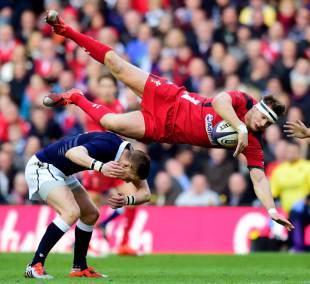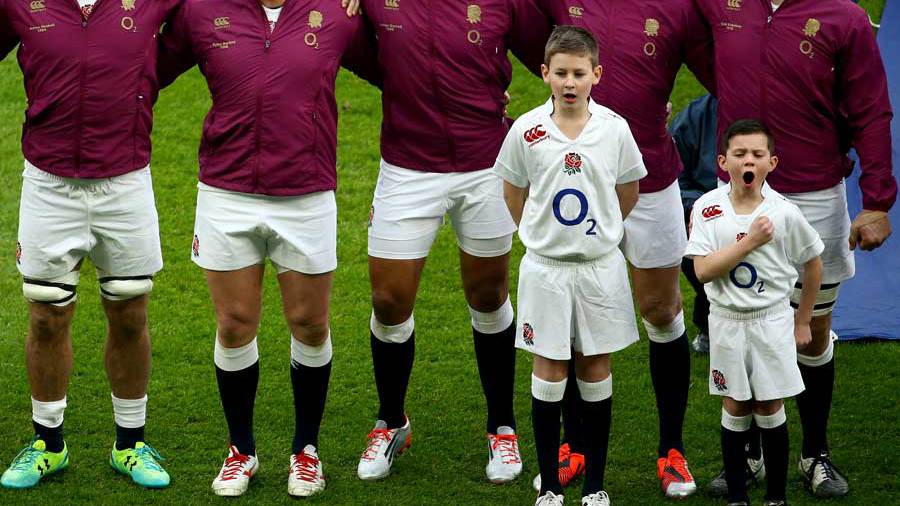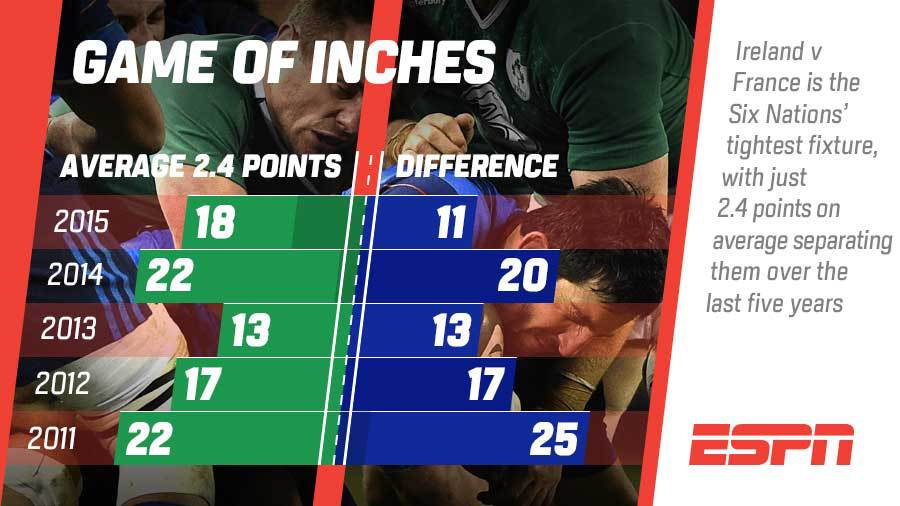|
Monday Maul
The lottery of challenging in the air
Tom Hamilton, Tristan Barclay and Huw Richards
February 16, 2015
England and Ireland are the only two unbeaten teams left in the Six Nations. Monday Maul looks at the key talking points from another eventful weekend of Six Nations action.
The lottery of challenging in the airSome of us have barely gotten used to Glen Jackson not being a player any more, so his ascent to the ranks of international refereeing has been a formidably quick one. And he was confronted with two contentious decisions in quick succession on Sunday, when first Finn Russell then Jonathan Davies took out airborne opponents. Russell's was the more serious offence, but a yellow card was probably the right decision in both cases. Asked, not unreasonably, by an aggrieved Dan Biggar why he had not sent off a player "who could have broken my neck", Jackson replied that "it was not intentional" - thereby drawing the vital line between the dangerous and the outright vicious which another ex-player referee Alain Rolland so signally failed to apply in the World Cup semi-final. Davies was perhaps slightly unlucky, his offence at the lower end of the yellow card scale. There were a fair few voices, not all of them Welsh-accented, arguing at Murrayfield that "if that was a yellow, Russell should have seen red". 
Finn Russell saw yellow for this
© Getty Images
Enlarge
But a personal review remains that the proper test of a sending off is the one applied by the late Roger Quittenton: "It's usually quite simple. You react instinctively 'you dirty sod', and off he goes". The gasps as Biggar fell were of concern for him, not horror at a viciously malicious act. And there are inevitably a range of offences punished by the same sanction. One possibility might be to introduce differential sin-binnings for different levels of offence, but the referee's job is surely complicated enough already. Huw Richards
Italy's Six Nations claims back under the spotlightLast year it was Scotland, this time around it is Italy. The question when one team starts floundering is whether they warrant their place in the Six Nations; the calls increase for a play-off between those lurking in the shadows of the European Nations Cup and those who lie nailed to the foot of the top table. After Italy's 30-point loss to England, Sergio Parisse - arguably the greatest Italian forward of all time - was sat in front of the press fielding questions over the Azzuri's legitimacy as Six Nations contenders. Despite their valiant performance in 2013 and the odd upset here and there, Italy have scooped 10 wooden spoons since their Six Nations debut in 2000. It makes grim reading for those of Italian persuasion but there is enough about Italy to warrant them keeping their place in the Six Nations. Questions have to be asked of their coaching team and their tendency to swap half-backs like they do socks - at present Italy have the first crash-ball fly-half in Six Nations history - and with a re-jig after the World Cup expected, you hope it could be the catalyst for improvement. But in the here and now, the issue of Italy and just where they stand will no doubt continue until they start picking up at least two wins on an annual basis. Until then, Parisse will continue to fight his team's corner with extreme politeness. 
© Scrum.com
Enlarge
"When you lose matches as we have against Ireland and England people ask questions but I think if anyone thinks Italy are only a little team there wouldn't be 82,000 people here today," Parisse said. "We've shown in previous years we deserve to be here - though this isn't the best moment for us. We want to do better, we have to be realistic... we have lost against two great teams." England coach Stuart Lancaster also fielded the question and he too supported the Azzurri's cause. His take came after his team were caused all sorts of bother by Italy. "You see with how much pride they play and we had an extra day's preparation. You ask any of our players how they feel in the changing room at the moment. They are a big, strong, physical team and we have a huge amount of respect for them." Tom Hamilton
Silence is goldenPlease respect the kicker. It's a simple request, but more than one or two in the crowd at the Aviva Stadium could understand on Saturday evening. Johnny Sexton kicked five of Ireland's six penalties as the hosts edged to victory over France and every one of them was greeted by jeers from rogue supporters in the stands. That the vast majority of those in attendance were on their best behaviour only served to amplify the booing from the minority. Dead-eye kicker that he is, Sexton was able to shut out the boo boys and steer Ireland to victory. But as the stadium announcer said over the tannoy, "ladies and gentlemen - please remember the long-standing tradition of silence for the kicker". It shouldn't be hard. Tristan Barclay
The perils of scoring firstOne message from the opening two rounds of the Six Nations is that scoring the first try can seriously damage your chances of winning. Scotland's failure to hang on to the early advantage of Stuart Hogg's superbly taken try against Wales means that only one team - Ireland in Italy on the opening day - has won after scoring first. Scotland have every reason to feel particularly disappointed, after scoring first in both matches and losing each time, while England reign unmatched as the tournament's Comeback Kids, as much individually in the persons of Haskell, Cipriani and Easter, as in the collective feat of coming from behind in both their matches. That reflects qualities in both teams - Scotland's fresh attacking verve and England's sheer resilience - which point to a decent contest at Twickenham in Round Four. Just don't be too surprised if England score first and Scotland win. Huw Richards
Time for change in FranceRory Kockott and Camille Lopez are the 14th different half-back pairing used by Philippe Saint-Andre in a little over two years as France head coach. After two stagnant performances in their opening Six Nations fixtures, the time has come for another change. Lopez should stay. He struggled to influence proceedings at the Aviva as Ireland edged out France for victory, but the Clermont man looks lively enough and, crucially, can kick a rugby ball. France have been crying out for a reliable kicker. Now they have one. Kockott is the man who needs to stand down. France have some genuine talent in the backline - Wesley Fofana and Teddy Thomas in particular - but they do not receive the ball enough. The South African-born scrum-half is all pick-and-go from the ruck, and that's if he isn't lying at the bottom of one. Sébastien Tillous-Borde was the No.9 of choice last November, but the Toulon man is currently in the treatment room. Time to dust off fan-favourite Morgan Parra and tell him to get that ball moving. Tristan Barclay
The mascot steals the showSix-year-old Harry Westlake and his passionate rendition of 'God Save the Queen' gatecrashed Twitter and led to coverage in the national press. For Lancaster, he will see it as a moment where players and supporters connected in the manner he envisaged when he took on the job. Tom Hamilton

© Getty Images
Enlarge
Revenge is anything but sweetSportsmen are often keen to trot out the cliché that they take every game as it comes, treating the next one the same as the last. But Sean O'Brien found a nice turn of phrase in warning his team-mates to forget the record books when they take on England next month. The only two undefeated of the six nations meet in a Grand Slam eliminator at the Aviva on March 1, with the added spice that England were the last team to beat Ireland in any competition. Joe Schmidt's men are now nine Tests unbeaten since defeat at Twickenham last year. O'Brien, however, cautioned against seeking to avenge that loss, saying that Ireland could end up with egg on their faces if they approach the game with the wrong mentality. "I don't think it's a case of revenge," he said. "If you go out to get revenge on a team, you'll get bit on the a*** probably. It's a case of being composed and measured, and making sure we have our details in place. We have to be singing off the same hymn sheet." Tristan Barclay

© Scrum.com
Enlarge
© ESPN Sports Media Ltd
|
Live Sports
Communication error please reload the page.
-
Football
-
Cricket
-
Rugby
-
- Days
- Hrs
- Mins
- Secs
F1 - Abu Dhabi GP
Abu Dhabi Grand Prix December 11-131. Max Verstappen ()
2. Valtteri Bottas (Mercedes)
3. Lewis Hamilton (Mercedes)
4. Alexander Albon ()
5. Lando Norris ()
6. Carlos Sainz Jr ()
-
ESPNOtherLive >>
Darts - Premier League
Golf - Houston Open
Snooker - China Open
Tennis - Miami Open


